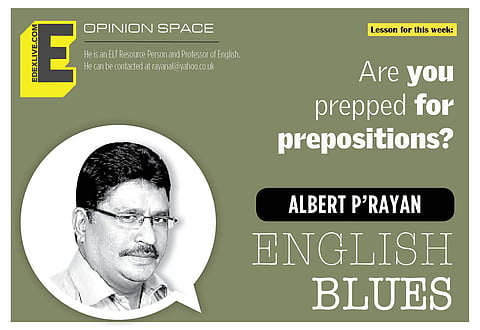

A week ago, an English language teacher sent me this query: “I came across the following sentence in a news report in a newspaper. ‘Shocked over the deletion of the names of Sasikala and 18 others from the voters’ list, AMMK candidate for Thousand Lights N Vaidhanathan on Monday petitioned the Election Commission of India...’ I would like to know whether ‘shocked over’ is correct.”
Is it ‘shocked over’ or ‘shocked at’? The preposition ‘at’ is used after ‘shocked’. Here are examples:
- Everyone was shocked at his misbehaviour.
- She looked shocked at the sight of a stranger.
The search for the phrase ‘shocked over’ in the British National Corpus (BNC) yielded only one result whereas the query ‘shocked at’ yielded over a hundred results. Based on the results, we can say that ‘shocked at’ is more commonly used.
In the same news report, I came across this sentence: “... demanding that the elections be postponed until their names are added in the list.” In this context, the correct prepositional phrase is ‘added to the list’ and not ‘added in the list’. Here are examples:
- Your name is added to the list automatically.
- The DNA-bind solution is shaken and 1 ml is added to the solution.
Look at the news report below. Try to fill in the seven blanks with correct prepositions.
By the middle of February, health workers _1_ an expansive hospital _2_ western India were beginning to believe that the coronavirus pandemic’s deadly surge was rapidly easing. There were only 28 patients _3_ the COVID-19 ward of the 1,000-bed non-profit Kasturba Hospital _4_ Wardha, Maharashtra — down from 180 patients _5_ the peak of the pandemic last summer. The intensive care unit (ICU) was empty _6_ the first time _7_ months.
It may not be a tough exercise for you. I guess you can easily guess the answers. The answers are: 1) at, 2) in, 3) in, 4) in, 5) at, 6) for, 7) in. If you have got all the seven answers correct, give yourself a pat on the back. How did you choose the correct prepositions? It is your familiarity with certain word chunks and prepositional phrases that helped you choose the correct preposition for each blank.
The best way to master prepositions is to become familiar with word chunks which consist of prepositions. When we speak and write, we use some phrases (chunks of language) such as on the other hand, for example, at the moment, and a lot of frequently.
By becoming familiar with word chunks, learners can easily learn to use correct prepositions. They can also build up their knowledge of prepositions by becoming familiar with prepositions of time, place and movement.
Tip: Do you want to test your knowledge of prepositions? Click the link below. After completing a quiz, you can check your score.
https://agendaweb.org/grammar/prepositions-english-exercises.html
